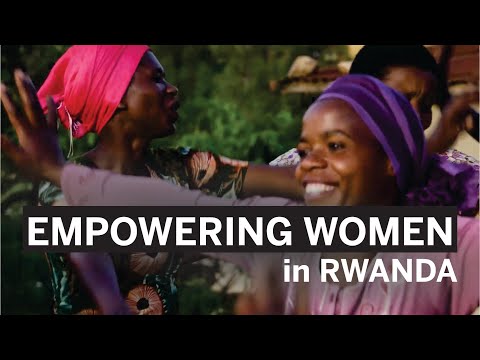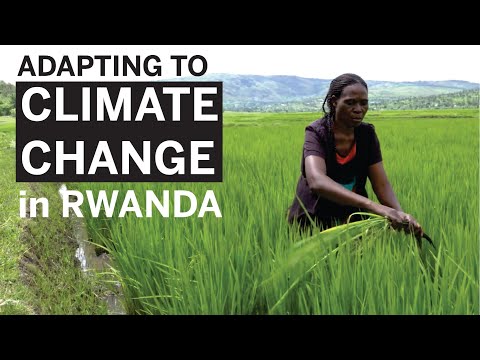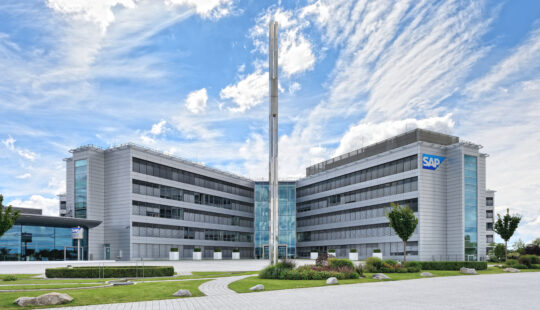Faustin Ngirunwonsanga describes himself as a happy man. “My wife’s idea to join a rice farmers’ cooperative has changed our lives completely,” he says. “Everything is better now.”
Thanks to a higher income, Ngirunwonsanga’s family of six now lives in a sturdily constructed home in the eastern province of Rwanda, about a two-hour drive from capital city Kigali. The house is built to withstand the heavy rains that hit Rwanda particularly hard between March and May and often cause severe flooding. A solar cell on the roof supplies the family with electricity and they have enough to eat and money for school fees and health insurance.
“It was as if I’d started my life over again,” says Faustin’s wife Beatrice, of the moment she joined the COPRORIZ-Ntende cooperative. Since its foundation in 2003, this community of rice farmers has blossomed into a powerful organization with more than 3,700 members. The fact that they have greater bargaining power means that they can all earn more. But it’s not just about money; the members help each other when it comes to buying land and finding employees to work that land.
“I was shy and isolated,” Beatrice says of her life before the cooperative. “I lived on land located on a steep slope in a region that wasn’t safe for me and my family.”

From Farmer to Entrepreneur
Beatrice is now a small-scale entrepreneur. She has increased her annual rice harvest from 1,300 pounds to more than 2,000, and at peak times employs up to seven people for the harvest. She is currently diversifying by setting up a poultry project to help ensure that she is less prone to the vagaries of the weather. Beatrice is also receiving support for this project from the cooperative, which thanks to growing income and membership is investing in tourism projects and operates a hotel.
The success of the COPRORIZ-Ntende cooperative is due in no small measure to Africa Development Consultant Ltd. (ADC), an organization that works closely with SAP. ADC is a recent partner in the SAP Social Sabbatical program, an award-winning pro-bono volunteering initiative that is simultaneously an out-of-the-box leadership development experience for SAP employees and a transformative capacity-building program for non-profits and social enterprises.
ADC was founded 13 years ago by three people, including Rebecca Ruzibuka, who now leads the company. “Our objective is to support businesses and grassroots initiatives in developing, financing, and executing projects,” she says.
ADC has already assisted with more than 500 projects and made a lasting difference in the lives of over 50,000 people. The support it offers often begins with basics such as good management and efficient accounting, then progresses to helping with designing marketing concepts and business plans as well as finding the right talent for jobs.
Ruzibuka’s motto is “Let them own it!” In her experience, it makes a huge difference whether cooperatives take responsibility for their projects themselves. And once they taste success, they tend to be inspired with all kinds of creative ideas for follow-up projects.

Economic Boom in Rwanda
Rwanda is one of Africa’s fastest-growing economies and is often held up as a model country for its willingness to reform. In 1994, genocide and civil war had brought the country to its knees both socially and economically. Rwanda’s new government, however, has succeeded in reconciling ethnic groups, revitalizing the economy, and lowering corruption and crime.
Although 39 percent of the country’s population is still living below the poverty line, Rwanda is a sought-after partner for foreign investment. In the 2019 World Bank Doing Business Index, which ranks countries on how easy it is to do business there, Rwanda was the only country with a low per-capita income to appear in the top 30. The government has also set targets on equality and better opportunities for women. The proportion of women in the Rwandan parliament (60 percent) is the highest in the world. In business, however, that figure is much lower.
Lack of Confidence Undermining Equal Opportunities
This is where social enterprise Resonate enters, with a mission to boost self-confidence of women and girls and prepare them to be leaders. “One of the big obstacles to creating a level playing field for men and women is the confidence gap,” explains Norette Turimuci, executive director of Resonate. “It’s a global phenomenon and one that exists as much in the board rooms of New York as in the remote villages of Africa.”
“Rwanda operates plenty of programs that focus on communicating hard skills and educating women,” she adds. “But without a belief in their own abilities, women often don’t manage to take that vital step and start a business, demand a promotion, or tackle the problems in their families.”
Resonate offers workshops that teach self-confidence, where women share their personal stories, explain their problems, and learn from others about how to overcome them. To show that it is possible for everyone to make an impact, every workshop begins with the fable of the little hummingbird. Rather than giving up in the face of a forest fire, it did everything it could to put it out, which meant carry a few drops of water.
This story was an eye-opener for Odette Nyirankundimana. For a long time, she had doubted her ability to care for her four children all alone when her husband left her. She came into contact with Turimuci’s team through Kasha Rwanda, a partner organization of Resonate. “I learned that I was the only one who could change my life and my family’s lives,” she says. “I, and I alone, am responsible.”
Ruth Iradukunda also confidently describes herself as a leader. After a workshop at Resonate in partnership with Cricket Builds Hope, she decided to find herself a better-paid job at a shoe factory. Iradukunda became a mother while still a teenager and now advises women on family planning, talks to them about contraception, and educates them about HIV.
“Resonate gave me the courage to knock on doors and take the chances that came my way,” she says, looking back. “Today, I speak in public and lead meetings, and I was also selected to be a health advisor in my community.” Her goal now is to train as a nurse.
Resonate has already helped more than 7,000 women and girls and works with over 65 partner organizations. But that’s just the beginning. “We want to extend our work to the rest of the region,” says Turimuci. “We’ve made it our mission to unlock the leadership potential of women in East Africa.”
Resonate and SAP Social Sabbatical
Resonate received help for its plans last year through the SAP Social Sabbatical program, an initiative close to the heart of Alexandra Van der Ploeg, head of Corporate Social Responsibility (CSR) at SAP. :“Over the last eight years, the program has brought private sector know-how and the expertise of 1,250 SAP employees to over 400 non-profits and social enterprises in almost 50 countries, solving their strategic business challenges and enabling them to run at their best. But it’s not just about social impact. Participation in a social sabbatical assignment has proven to be a unique way of developing employees into more empathetic global citizens as well as business leaders embodying SAP’s values and leadership principles.”
SAP Social Sabbatical began with three pilots in 2012 and has expanded to more than 20 assignments annually. Collectively, participants have delivered an in-kind contribution of €18.8 million and roughly 320,000 service hours, impacting nearly 5 million lives around the world.
Video by John Hunt and Rana Hamzakadi. Top image via SAP TV.



